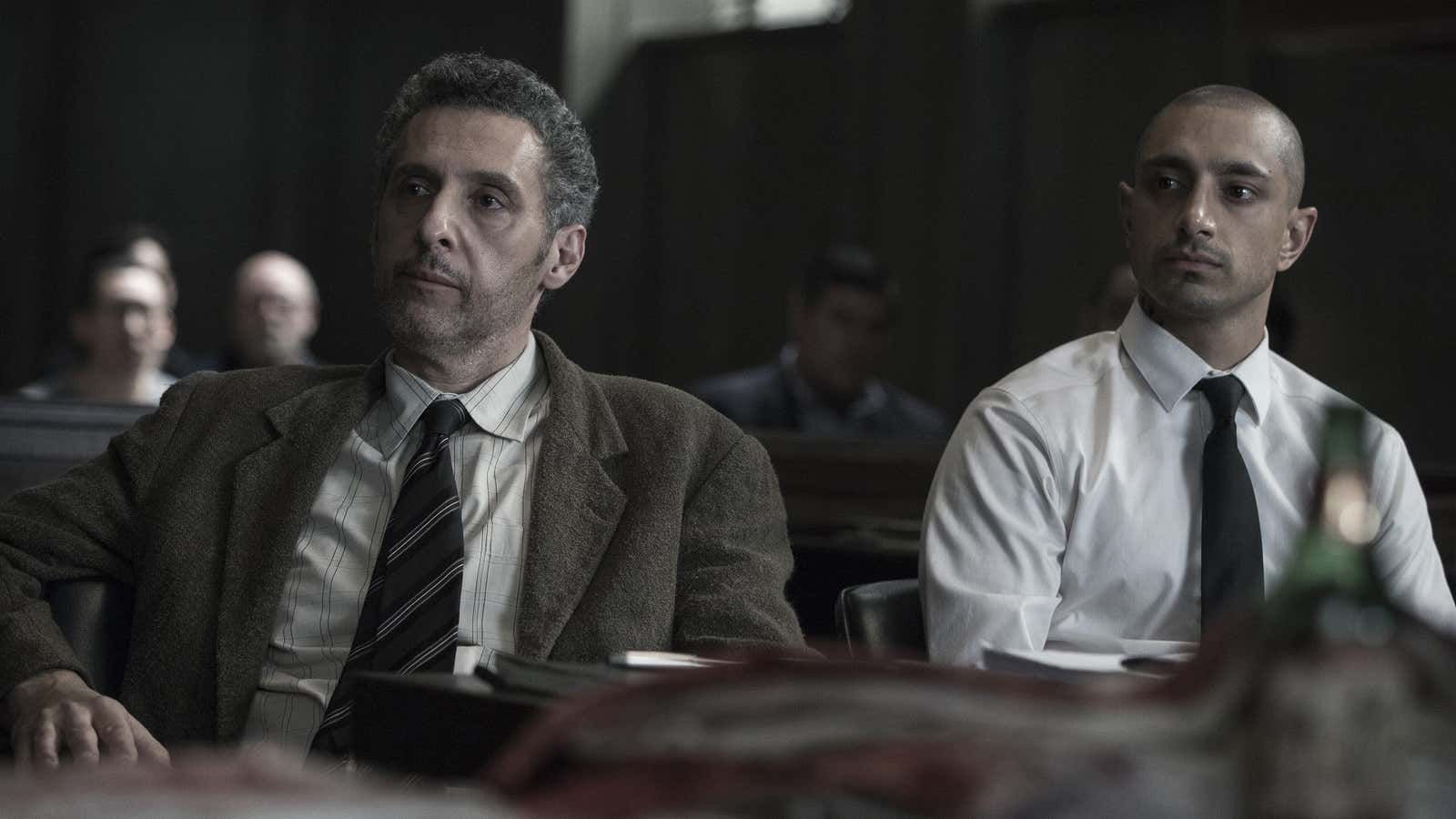It’s not easy having eczema, especially when you’re a cut-rate lawyer responsible for convincing a jury, with no preparation, that your young client, who’s shaved his head and inked his neck in prison, is innocent of a murder it clearly looks as though he committed—but maybe, in front of this jury of your peers who look in disgust at your sickly face, you don’t have to argue he’s innocent, you just have to sow the seeds of doubt, that you simply have to ask these men and women what they think, and what they feel, even as in that moment you’d probably like nothing more than to claw at your face and jump into a vat of acid.
That’s exactly what John Turturro’s character in The Night Of, John Stone, is faced with in the finale of the HBO crime miniseries (which aired Aug. 28). Stone’s tenacious skin disease, a darkly comic recurring subplot, breaks out all over his face and body the night before he must deliver a closing argument absolving his client, Naz, of murder in the first degree.
Stone’s speech and Turturro’s performance are both magnificent. Stone doesn’t normally do this sort of thing. He’s not Clarence Darrow. He’s more Saul Goodman, the sleazy lawyer from Breaking Bad, than Atticus Finch. No one is naming their children after John Stone.
Stone doesn’t end his speech with some final, decisive strike, proving once and for all that Naz is innocent. Rather, the speech just sort of trails off, as Stone, visibly dejected and exasperated, tells the jury that there isn’t a real definition of “reasonable doubt,” it’s just whatever they think or feel in that moment, when the power to decide another person’s fate rests solely in their hands.
It might not be quite as memorable as Finch’s closing line in To Kill a Mockingbird (“In the name of God, do your duty”) or as forceful as Lieutenant Daniel Kaffee’s legendary roar in A Few Good Men (“I want the truth!”), but it’s every bit as poignant. Here is a man, looking like he belongs in a hospital and on the verge of tears over the prospect of an innocent young man imprisoned, making an earnest effort—perhaps the first one of his entire, pathetic life—to prevent that from happening.
Yet, one storytelling miscue could taint the legacy of this fine scene. Stone only gives the closing argument because Chandra, a novice lawyer who had been serving as Naz’s primary defense, screws up so royally that Stone has to take over and save the day. She’s caught smooching her client and bringing him drugs while visiting in prison, forcing the judge to remove her from the trial and insert Stone in her stead.
And that’s all after she insists on putting Naz on the stand, a move that predictably backfires. Instead of firmly stating his innocence under oath, Naz says, in a moment of what seems like will prove to be tragic honesty, that he doesn’t know for sure he didn’t kill the victim, Andrea. At that point, a conviction seems a fait accompli. It’s only because Stone cleans up Chandra’s mess that the jury ends up in a deadlock and district attorney Helen Weiss decides not to retry the case—sending Naz home free.
Many critics and viewers voiced their displeasure with the show’s treatment of Chandra’s character, arguing that her borderline idiotic decisions existed solely as plot devices to get Stone in a position to deliver his rousing closing argument. While it’s not necessarily unrealistic for a young, inexperienced attorney to make bad choices during a tense and stressful murder trial, it’s tough to argue that there couldn’t have been a way get Stone in front of the jury that didn’t also turn Chandra into a complete stooge.
Still, that shouldn’t blacken Turturro’s performance. In a role originally meant for the late, great Sopranos star James Gandolfini, Turturro fully embodied the spirit of a lonely, beaten-down man who had never done anything of real consequence and was given one shot at saving someone’s life.
See how it stacks up against some of the other great scenes from courtroom dramas:
